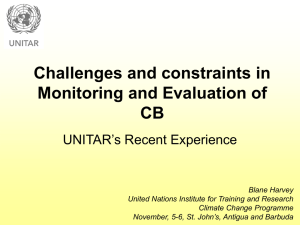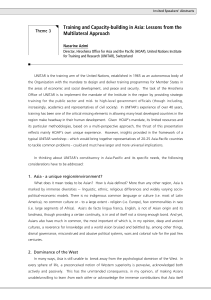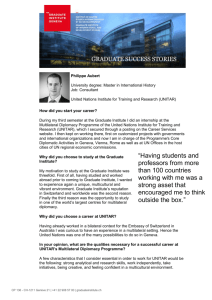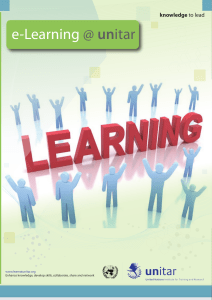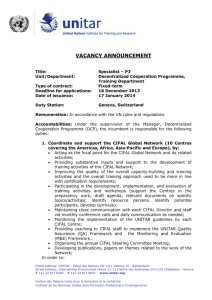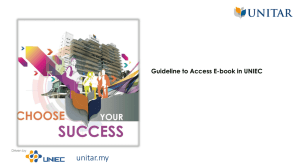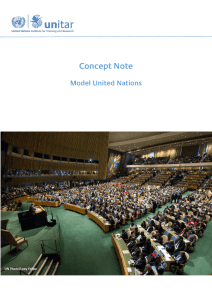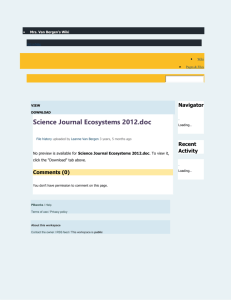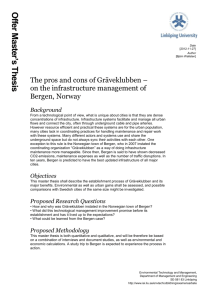What is UNITAR? - Bergen kommune
advertisement
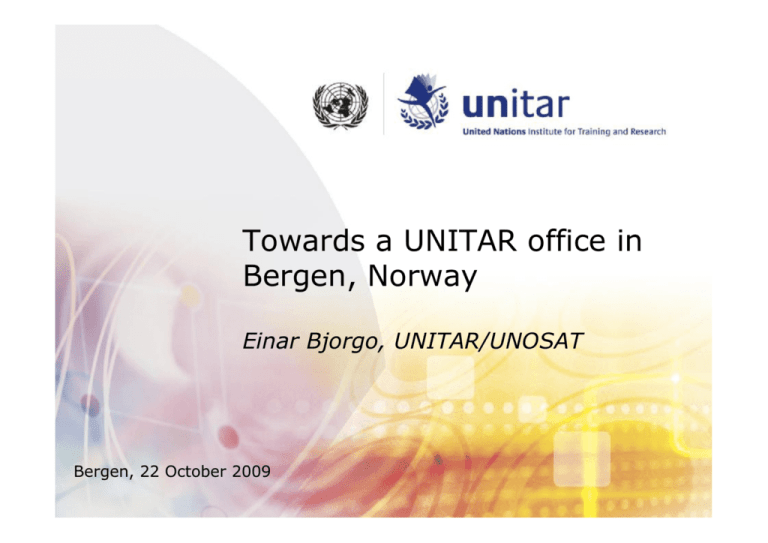
Towards a UNITAR office in Bergen, Norway Einar Bjorgo, UNITAR/UNOSAT Bergen, 22 October 2009 2 What is UNITAR? United Nations Institute for Training and Research Mission: To deliver innovative training and integrate research on knowledge systems for capacity development of beneficiaries (UN Member States, local governments, sister agencies, NGOs, IOs) Since its inception in 1965, UNITAR has built sustainable partnerships acquiring unique expertise and accumulating experience and knowledge to fulfil its mandate. These accomplishments have enabled UNITAR to respond to the growing demand from UN Member States for training and capacity development in the fields of Environment; Peace, Security and Diplomacy; and Governance Offices: Geneva (HQ), New York, Hiroshima, (Brazil) Intergovernmental Panel on Climate Change (IPCC) Fourth Assessment Report, 2007: Continued Green House Gas (GHG) emissions at or above current rates would cause further warming and induce many changes in the global climate system during the 21st century that would very likely be larger than those observed during the 20th century. Numerous long-term changes in the climate have been observed, including extreme weather such as droughts, heavy precipitation, heat waves and the intensity of tropical cyclones. A future of more severe storms and floods along the world's increasingly crowded coastlines is likely. Source: IPCC, 2007 Regions likely to be specially affected by climate change: Arctic, because of the impacts of high rates of projected warming on natural systems and human communities Africa, because of low adaptive capacity and projected climate change impacts small islands, where there is high exposure of population and infrastructure to projected climate change impacts Asian and African megadeltas, due to large populations and high exposure to sea level rise, storm surges and river flooding Source: IPCC, 2007 Increased awareness of international humanitarian community: Recent severe storms, floods and droughts appear to show that computer models predicting more frequent "extreme weather events" are on target. Examples of potential climate change impact on humanitarian relief and human rights: disruptions in food supply in a world that is already afflicted with food shortages and famines access to freshwater supplies is decreasing in most populated areas most affected: developing world - fewer resources for coping with storms, floods, droughts, disease outbreaks, and disruptions to food and water supplies. ...potentially leading to more natural disasters with devastating effects on local communities, incrased conflicts due to tensions over natural resources and forced migration following conflicts and changed climatic conditions More knowledge is needed to better understand how climate change, humanitarian Photo: UNHCR relief and human rights issues interact. Only then can a more holistic approach be implemented where people live – locally. P Photo: Gov. Philippines UNITAR Bergen office The Bergen office will be a hub for UNITAR’s collaboration with Nordic actors. The expertise available regionally, nationally and locally in the fields of humanitarian assistance, human rights and climate change research is significant. Why Bergen? (why not?) Local internationally renowned expertise in climate change research, humanitarian relief and human rights. Examples: University of Bergen, Bjerknes Centre for Climate Research, Christian Michelsen Institute, Rafto Foundation, Nansen Environmental and Remote Sensing Centre, UN Association, etc. Strong local, regional and national support Modern city development and easy access from anywhere in the world ensures strong sustainability Photo: Bergen Tourist Office The Bergen office will Act as UNITAR antenna for the Nordic countries and provide a link between relevant UNITAR and sister agencies programmes/activities with the expertise existing in Bergen, Norway and other Nordic countries Together with local, national and regional partners implement ground-breaking research with focus on humanitarian, human rights and climate change thematic, including mapping output when appropriate Facilitate fund raising for all UNITAR programmes concerned In addition, the office is foreseen to be a door-opener for local expertise (students, researchers, business) to the United Nations. National and Nordic partners Examples of partners in Norway: Kongsberg Satellite Services based in Tromso, UN Environment Programme Grid-Arendal and UN Development Programme Oslo Governance Centre. Examples of Nordic region partners: Metria of Sweden, National Survey and Cadastre of Denmark. 13 Status 2007: Informal contacts and discussions on feasability of UNITAR presence in Bergen 2008: UNITAR Executive Director letter to City of Bergen (CoB) formally indicating interest of UNITAR presence First mission from Geneva to Bergen meeting with local authorities and potential research partners in cllimate change 2009: Feb: Joint mission City of Bergen & UNITAR to Ministry of Foreign Affairs in Oslo presentation of idea. General support towards office at MFA Feb: Mission by City of Bergen to UNITAR in Geneva to learn more of organization and UN's main office in Europe Feb: Mission by UNOSAT to Bergen for formal discussions with City of Bergen and County of Hordaland, discussions with potential partners in human rights 14 Status (contn’d) Aug: Joint mission (CoB, UNITAR) to MFA State Secretary Gry Larsen. Formal talks and presentation of status. Request for political and financial support towards the office Sep: Funding by CoB to UNITAR for preparatory work in support to the establishment of the office Oct: Meeting in Geneva: Commissioner Lisbeth Iversen and Climate Chief Eva Britt Isager from City of Bergen met with UNITAR Executive Director Carlos Lopes Nov: All interested local and county actors invited to Geneva for information meeting and visit of UNITAR / UN Office in Geneva Current status: Ready for rapid implementation of Office as soon as commitment from MFA is received UNITAR Operational Satellite Applications Programme (UNOSAT) Using satellite imagery, satellite communication and satellite navigation (GPS) to improve humanitarian relief and development, human rights, adaptation to climate change Pragmatic approach, but need to understand the big picture Collaboration UNITAR Bergen and UNITAR Geneva (CERN) Better use of download station at Svalbard, work with local, national and regional expertise in training and methods development 16 UNOSAT rapid mapping 2003-2009 (173 activations) 17 Rapid mapping by type of emergency 2008-2009 22 23 6 February 2009 IDP shelters erected along beach zone Several thousand IDP shelters erected on beach, most within 200 m of coastline 6 March 2009 www.unitar.org einar.bjorgo@unitar.org
